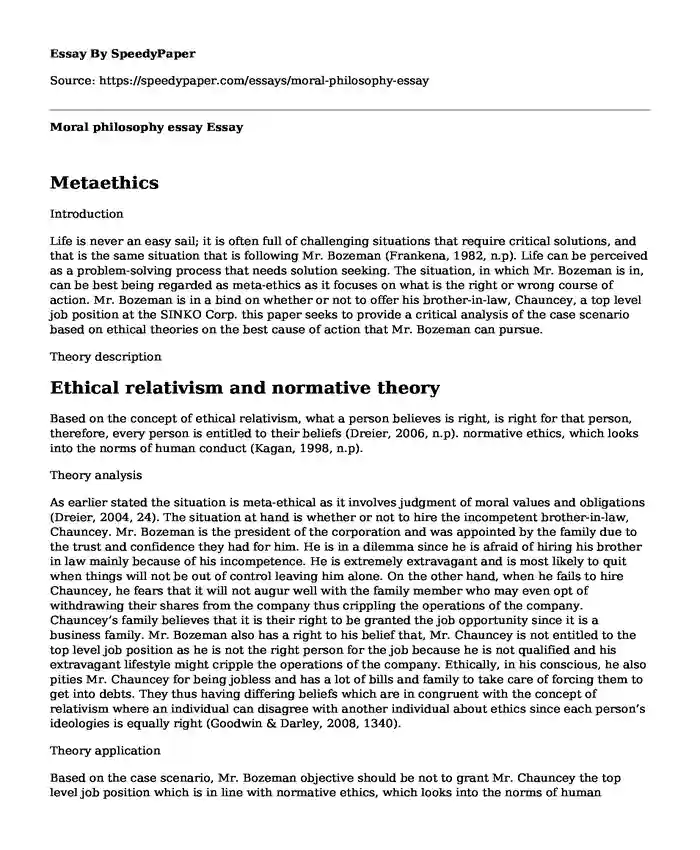
| Type of paper: | Essay |
| Categories: | Philosophy Ethics |
| Pages: | 3 |
| Wordcount: | 714 words |
Metaethics
Introduction
Life is never an easy sail; it is often full of challenging situations that require critical solutions, and that is the same situation that is following Mr. Bozeman (Frankena, 1982, n.p). Life can be perceived as a problem-solving process that needs solution seeking. The situation, in which Mr. Bozeman is in, can be best being regarded as meta-ethics as it focuses on what is the right or wrong course of action. Mr. Bozeman is in a bind on whether or not to offer his brother-in-law, Chauncey, a top level job position at the SINKO Corp. this paper seeks to provide a critical analysis of the case scenario based on ethical theories on the best cause of action that Mr. Bozeman can pursue.
Theory description
Ethical relativism and normative theory
Based on the concept of ethical relativism, what a person believes is right, is right for that person, therefore, every person is entitled to their beliefs (Dreier, 2006, n.p). normative ethics, which looks into the norms of human conduct (Kagan, 1998, n.p).
Theory analysis
As earlier stated the situation is meta-ethical as it involves judgment of moral values and obligations (Dreier, 2004, 24). The situation at hand is whether or not to hire the incompetent brother-in-law, Chauncey. Mr. Bozeman is the president of the corporation and was appointed by the family due to the trust and confidence they had for him. He is in a dilemma since he is afraid of hiring his brother in law mainly because of his incompetence. He is extremely extravagant and is most likely to quit when things will not be out of control leaving him alone. On the other hand, when he fails to hire Chauncey, he fears that it will not augur well with the family member who may even opt of withdrawing their shares from the company thus crippling the operations of the company. Chauncey’s family believes that it is their right to be granted the job opportunity since it is a business family. Mr. Bozeman also has a right to his belief that, Mr. Chauncey is not entitled to the top level job position as he is not the right person for the job because he is not qualified and his extravagant lifestyle might cripple the operations of the company. Ethically, in his conscious, he also pities Mr. Chauncey for being jobless and has a lot of bills and family to take care of forcing them to get into debts. They thus having differing beliefs which are in congruent with the concept of relativism where an individual can disagree with another individual about ethics since each person’s ideologies is equally right (Goodwin & Darley, 2008, 1340).
Theory application
Based on the case scenario, Mr. Bozeman objective should be not to grant Mr. Chauncey the top level job position which is in line with normative ethics, which looks into the norms of human conduct (Kagan, 1998, n.p). Mr. Bozeman is the president of the corporation and should make a decision that is in the best interest of the company. Notably, Mr. Chauncey has no good history of employment, besides his charming nature. His is not apt with decision making. Furthermore, the board management of the corporation has turned Mr. Chauncey candidature for the top position down thus hiring him will be against labor regulations. The best decision for Mr. Bozeman is to engage all the family members including the wife, on what is best for the company. He can help him secure a job elsewhere, or he has to convince beyond doubt that he will change his conduct especially with regards to decision making and his extravagantness nature. If Mr. Chauncey is ready and willing to embrace change, then Mr. Bozeman can convince the board to offer him a job at the company but not the top level manager. He has to work hard for his way up to that position. By so doing, Mr. Bozeman will have maintained a positive relation with the family and will not have affected the operations of the company.
References
Dreier, J. (2004). MetaEthics and The Problem of Creeping Minimalism. Philosophical Perspectives, 18(1), 23-44.
Dreier, J. (2006). Moral relativism and moral nihilism.
Frankena, W. K. (1982). Thinking about morality.
Goodwin, G. P., & Darley, J. M. (2008). The psychology of meta-ethics: Exploring objectivism. Cognition, 106(3), 1339-1366.
Kagan, S. (1998). Normative ethics.
Cite this page
Moral philosophy essay. (2018, Jan 30). Retrieved from https://speedypaper.net/essays/moral-philosophy-essay
Request Removal
If you are the original author of this essay and no longer wish to have it published on the SpeedyPaper website, please click below to request its removal:
- Essay Example for Free: Slavery and Freedom - The American Paradox
- Free Essay Sample: Optimization of Satellite Communication
- Point of View on The Watchmen Novel, Free Essay in Literature
- Essay Sample Offering a Defensible Solution to Caffeine Consumption
- Essay Example on the Dissemination of Evidence Based Practice
- Free Essay Sample. The Special Theory of Relativity
- Essay Sample on The Voucher System
Popular categories




